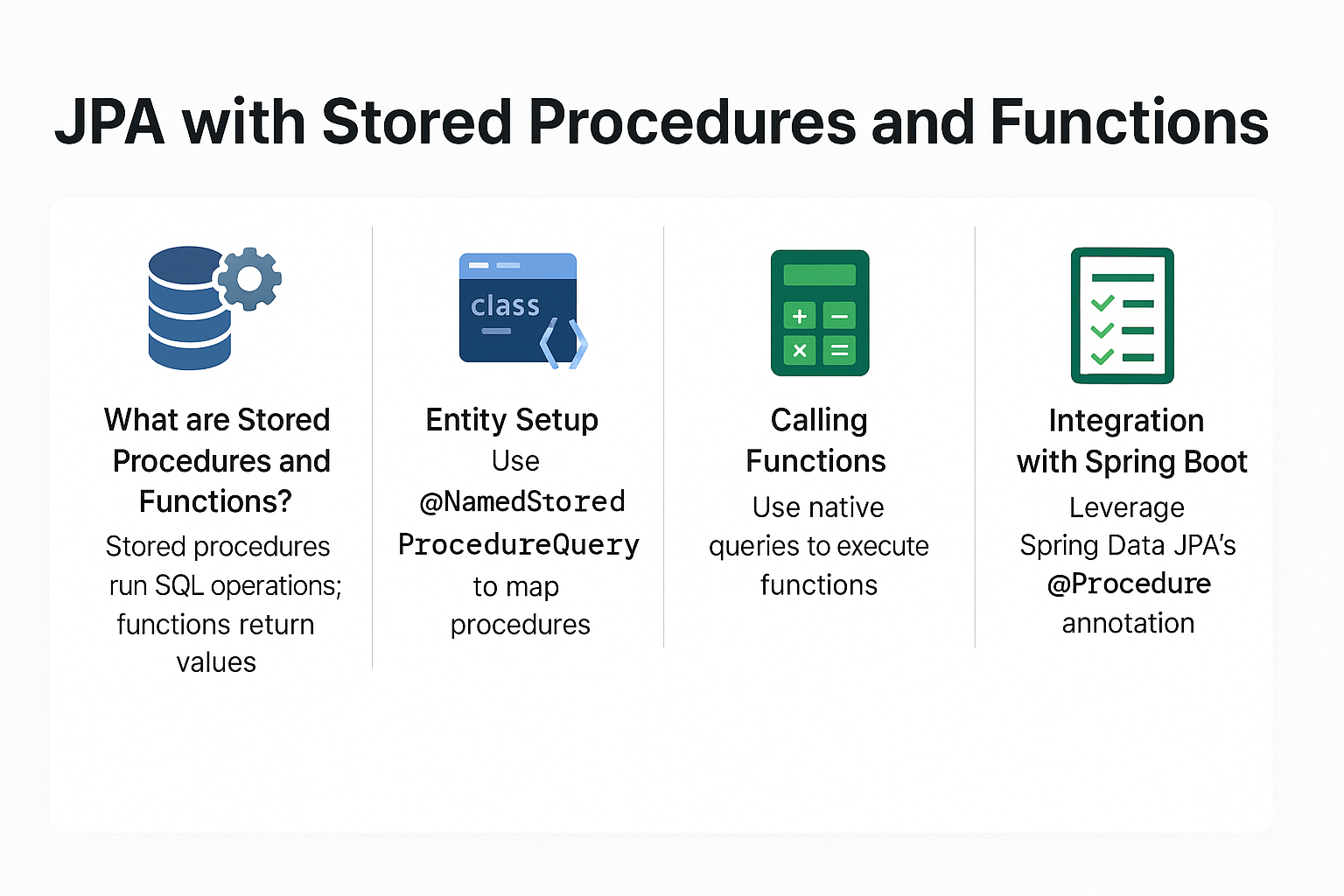While JPA provides JPQL, Criteria API, and native SQL queries, there are scenarios where database-level stored procedures and functions are more efficient. These can encapsulate business logic in the database, reduce round trips, and leverage optimized vendor-specific implementations.
JPA allows developers to call stored procedures and functions seamlessly, blending ORM abstraction with database power. This tutorial explores configuration, annotations, EntityManager APIs, SQL outputs, pitfalls, and best practices.
1. What are Stored Procedures and Functions?
- Stored Procedure: Precompiled set of SQL statements stored in the database. It can perform operations like inserts, updates, and complex logic.
- Function: Similar to stored procedures but always returns a value and can be used in SQL expressions.
Analogy:
- Stored Procedure = A complete service at a restaurant (starter → main course → dessert).
- Function = A specific dish from the menu that always provides a result.
2. Database Setup Example
-- Stored Procedure Example
CREATE PROCEDURE get_accounts_by_balance(IN min_balance DECIMAL)
BEGIN
SELECT * FROM accounts WHERE balance >= min_balance;
END;
-- Function Example
CREATE FUNCTION account_count() RETURNS INT
BEGIN
DECLARE cnt INT;
SELECT COUNT(*) INTO cnt FROM accounts;
RETURN cnt;
END;
3. Entity Setup
import jakarta.persistence.*;
@Entity
@Table(name = "accounts")
@NamedStoredProcedureQuery(
name = "Account.getAccountsByBalance",
procedureName = "get_accounts_by_balance",
parameters = {
@StoredProcedureParameter(mode = ParameterMode.IN, name = "min_balance", type = Double.class)
},
resultClasses = Account.class
)
public class Account {
@Id
@GeneratedValue(strategy = GenerationType.IDENTITY)
private Long id;
private String owner;
private double balance;
// getters and setters
}
4. Calling Stored Procedures in JPA
Using Named Stored Procedure
EntityManager em = emf.createEntityManager();
StoredProcedureQuery query = em.createNamedStoredProcedureQuery("Account.getAccountsByBalance");
query.setParameter("min_balance", 1000.0);
List<Account> accounts = query.getResultList();
accounts.forEach(a -> System.out.println(a.getOwner() + " - " + a.getBalance()));
em.close();
SQL Output
CALL get_accounts_by_balance(1000.0);
5. Calling Functions in JPA
JPA doesn’t have direct annotations for functions, but you can use native queries.
Query query = em.createNativeQuery("SELECT account_count()");
Integer count = (Integer) query.getSingleResult();
System.out.println("Total accounts: " + count);
6. Using EntityManager API
StoredProcedureQuery query = em.createStoredProcedureQuery("get_accounts_by_balance", Account.class);
query.registerStoredProcedureParameter("min_balance", Double.class, ParameterMode.IN);
query.setParameter("min_balance", 2000.0);
List<Account> results = query.getResultList();
7. Integration with Spring Boot
Spring Data JPA provides an elegant way to call stored procedures.
public interface AccountRepository extends JpaRepository<Account, Long> {
@Procedure(name = "Account.getAccountsByBalance")
List<Account> getAccountsByBalance(@Param("min_balance") Double minBalance);
@Query(value = "SELECT account_count()", nativeQuery = true)
Integer getAccountCount();
}
Usage:
@Autowired
private AccountRepository repo;
public void run() {
List<Account> richAccounts = repo.getAccountsByBalance(5000.0);
System.out.println("Accounts found: " + richAccounts.size());
Integer count = repo.getAccountCount();
System.out.println("Total accounts: " + count);
}
8. Performance Considerations
- Stored procedures reduce network overhead by executing logic in the database.
- Functions are best suited for reusable computations.
- Overusing procedures may reduce portability across databases.
- Debugging stored procedures can be harder compared to JPQL/Criteria API.
9. Pitfalls and Anti-Patterns
- Vendor Lock-In: Procedures/functions may not be portable across databases.
- Ignoring Transactions: Ensure procedures respect JPA’s transactional boundaries.
- Mixing Business Logic: Don’t move all logic to DB; balance between application and database.
- Improper Parameter Mapping: Always verify parameter names/types match DB definitions.
10. Best Practices
- Use stored procedures for performance-critical operations.
- Use functions for reusable calculations.
- Keep entity mappings consistent with database schema.
- Wrap stored procedure calls in service classes for better testability.
- Use Spring Boot integration for cleaner repository APIs.
📌 JPA Version Notes
- JPA 2.0: No support for stored procedures; only JPQL, Criteria API.
- JPA 2.1: Added support for stored procedures with
@NamedStoredProcedureQuery. - Jakarta Persistence (EE 9/10/11): Package renaming (
javax.persistence→jakarta.persistence). No breaking changes in stored procedure support.
Conclusion and Key Takeaways
- Stored procedures and functions extend JPA’s querying power.
- JPA 2.1 introduced direct stored procedure support.
- Use EntityManager or Spring Data JPA for clean integration.
- Always balance portability vs performance when using database-level logic.
FAQ (Expert-Level)
Q1: What’s the difference between JPA and Hibernate?
A: JPA is a specification; Hibernate is one of its most popular implementations.
Q2: How does JPA handle the persistence context?
A: JPA tracks managed entities, synchronizes changes with the database at flush/commit.
Q3: What are the drawbacks of eager fetching in JPA?
A: It loads unnecessary data upfront, reducing performance.
Q4: How can I solve the N+1 select problem with JPA?
A: Use JOIN FETCH, batch fetching, or @EntityGraph.
Q5: Can I use JPA without Hibernate?
A: Yes, implementations like EclipseLink and OpenJPA exist.
Q6: When should I use stored procedures in JPA?
A: For performance-heavy operations or when DB logic is already standardized.
Q7: Can JPA map function results directly to entities?
A: Functions usually return scalars, but you can wrap them in native queries and map results.
Q8: Do stored procedures support OUT parameters in JPA?
A: Yes, you can register OUT parameters via StoredProcedureQuery.
Q9: Is JPA suitable for microservices?
A: Yes, but avoid over-dependence on DB-specific features for portability.
Q10: When should I avoid stored procedures in JPA?
A: Avoid them when portability, maintainability, and testability are top priorities.
